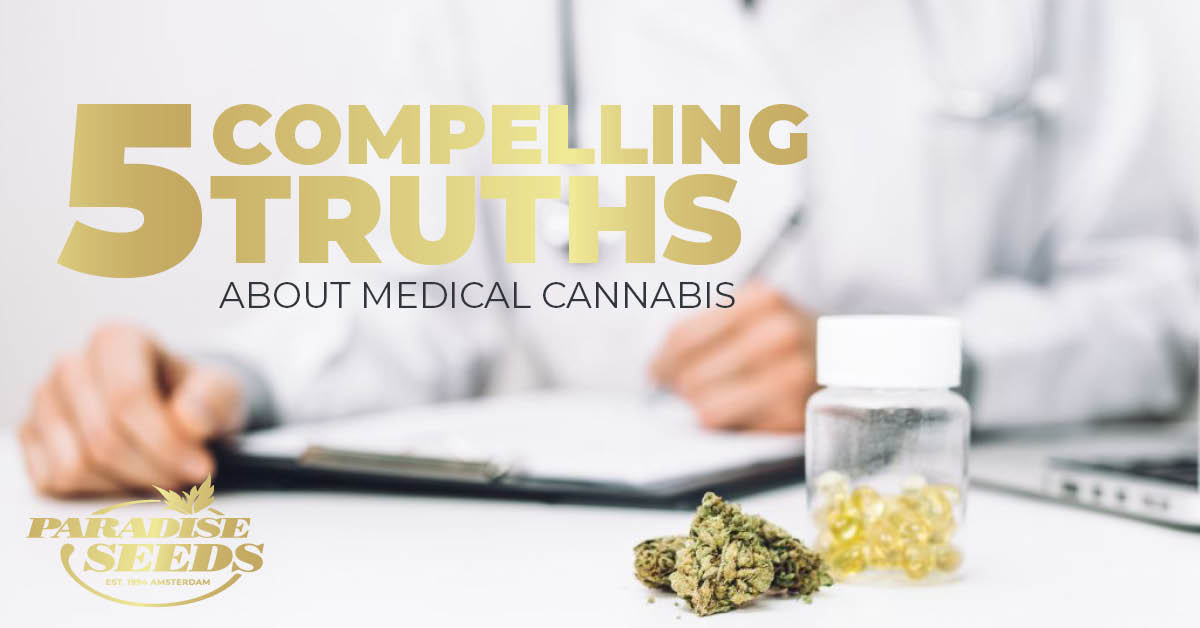The therapeutic use of cannabis has gained widespread acceptance due to scientific advancements and decades of experience. Although it is proven to alleviate certain symptoms, its efficiency for other conditions is restricted. We have compiled a list of conditions for which medical cannabis has the strongest scientific and personal evidence of effectiveness.

Science vs medical cannabis patient experience
As of 2021, there were over 36,000 peer-reviewed papers on cannabis and its cannabinoids, with more than 20,000 published in just the past decade [1]. That’s a lot to sift through! And even if you narrow it down to systematic reviews and meta-analyses, there are still hundreds of studies to consider.
In this blog post, we’ll rely on a few comprehensive studies that are widely recognized, as well as some recent research. We’ll also look at patient feedback for the medical conditions that cannabis is most commonly prescribed for worldwide. By combining these two sources of information, we’ve identified five areas where medical cannabis can be particularly effective.
1) Chronic Pain and medical cannabis use
About 1 in 3 people in developed countries suffer from chronic pain, which they experience on a daily basis for at least six months. For centuries, cannabis has been recognized for its pain-relieving properties, and it should come as no surprise that doctors routinely recommend it for this reason.
Medical cannabis is prescribed for pain in about 75% of all cases in Germany, Denmark, Czech Republic and the United States. It is worth noting that pain-related conditions vary, from rheumatoid arthritis to neuropathic pain, but medical cannabis has proven to be effective for most of them.
A systematic review [2] of medical cannabis in 2017 found that there is “substantial evidence that cannabis is effective for chronic pain, especially neuropathic pain in MS”.
In addition, the European Monitoring Centre for Drugs and Drug Addiction (EMCDDA) concluded in their meta-analysis [3] that there is “substantial evidence that cannabis is an effective treatment for chronic pain in adults”.
Patients who have used medical cannabis to manage pain have reported significant relief, with a German study [4] from 2023 indicating that 9 out of 10 patients experienced relief from cannabis therapy.
The study included almost 200 patients, of whom 88% reported a moderate or significant improvement in their overall health after starting cannabis therapy. Doctors reported that 61% of participants experienced “significant pain relief”, 66% had improved sleep, and 34% had improved mental well-being.
2) Using cannabis for multiple Sclerosis and related muscle spasms
When William Brooke O’Shaughnessy introduced the therapeutic values of cannabis to Western medicine in the 1840s [5], he already mentioned the area of muscular spasms.
It speaks for itself then that in the past few decades, the largest number of scientific reviews have evaluated the effect of medical cannabis on MS-related pain.
The EMCDDA committee concluded that nabiximols, a 1:1 THC:CBD preparation, and cannabinoids “were ‘probably effective’ in reducing the patient-rated severity of spasticity in MS” [3].
A review of six randomized controlled trials [6] also found evidence that combined THC and CBD extracts may provide therapeutic benefits for MS spasticity symptoms.
In a 2023 Austrian study [7], 87.5% of MS patients were at least partially satisfied with cannabis-based therapy after three months of use, while previous anticonvulsant treatments were only satisfactory for one-third of them.
Furthermore, over half of Canadian MS patients use cannabis for symptom treatment, with moderate to high effectiveness and generally mild adverse effects [8].
3) THC/CBD for appetite loss and nausea in HIV/AIDS and cancer patients
Most people associate smoking pot with giggles and munchies due to clichéd comedies. However, few realize that alleviating nausea and increasing appetite is a matter of life and death for many suffering from various diseases.
The appetite-boosting effect of cannabis has been known for millennia, and human trials in the 1970s analyzed its effect on weight gain.
Not all cannabis fans are aware that activist Denis Peron launched the present US medical marijuana movement in the early 1990s. He gave cannabis to HIV and cancer patients to help cope with symptoms such as nausea, lack of appetite, and wasting.
In the same decade, studies have explored the endocannabinoid system and revealed that activating the CB1 receptor with cannabinoids such as THC boosts appetite and alleviates nausea.
However, limited evidence or inconclusive results are often found in studies because cannabis flowers or whole plant-based preparations are seldom used.
Dr. Bonni Goldstein, a physician and medical director at Canna-Centers, notes in her book “Cannabis is Medicine,” that many cancer patients find inhaled cannabis extremely helpful for enhancing appetite, stabilizing weight, and enjoying meals [9].
She also claims that THC-rich products are more effective in boosting appetite than low-ratio or CBD-dominant products.
4) Medical cannabis and epilepsy
Epilepsy is a frequent brain disorder that causes recurring seizures. Although there are many new medications available for epilepsy, one out of three patients still cannot achieve seizure control, and others may suffer from severe adverse side effects.
In 2018, a review of CBD studies found that 71% of patients with treatment-resistant epilepsy experienced a reduction in seizures after taking CBD-rich products [10].
The CBD boom for epilepsy began in 2013 with the story of Charlotte Figi, a 7-year-old girl who suffered from a rare form of epilepsy called Dravet syndrome. At five years old, she experienced up to 300 grand mal seizures a week.
After her mother’s research, she started taking oil from a low-THC, high-CBD cannabis plant, later renamed Charlotte’s Web. After a short term of use, her epileptic seizures decreased to two or three per month.
As a result, some pharmaceutical companies immediately began developing CBD-based medicines to treat epilepsy. Today, research [11] and patient experience [12] both demonstrate that whole-plant preparations, or cannabis flower buds with high CBD content, are more effective in treating epilepsy than CBD alone.
This is due to the so-called “entourage effect,” in which various cannabis compounds work together to enhance the overall benefits.
5) Cannabis research for anxiety and depression
Let’s delve into the controversial topic of treating certain mental disorders with cannabis. Although cannabis is commonly used to boost mood and reduce stress, its effectiveness in treating mental disorders is not entirely clear.
According to research data [13], nearly 7% of the world’s population, or around 550 million people, live with depression, anxiety, or both. It’s concerning that 40-60% of those taking medication for these conditions don’t experience relief from their symptoms.
As a result, there is growing interest in cannabis therapy among scientists and patients.
While there is limited research on the efficacy of cannabis treatment for anxiety and depression in humans, a clear pattern is emerging from experience. A review of thirty-one studies [14] found that seven out of nine studies of medical cannabis reported mood improvement across various conditions, including chronic pain, MS, and HIV.
As stated in a recent study conducted in the UK [15], around 1800 participants were analyzed and the results showed that 86% of patients experienced a decrease in symptoms of anxiety or depression after completing a three-month medical cannabis treatment.
At the very least, it seems likely that the endocannabinoid system plays an important role in regulating anxiety levels and mood.
This suggests that the dysfunction itself could be causing the symptoms and that targeting the malfunctioning system with cannabinoids could provide relief for associated disorders. However, more research is needed to understand the mechanism and effective forms of treatment.

Growing medical cannabis as a human right
It’s a fundamental human right to have access to the most appropriate treatment for specific medical conditions. Hence, cultivating medical cannabis for personal use should also be considered a basic human right for patients.
In this light, Paradise Seeds continues to offer a Medical Cannabis Program,providing patients with a 50% discount on all seed purchases. Before using cannabis as part of your therapy, it is recommended to consult with your doctor to ensure optimal results.
Tamas Kardos
- NORML, “Recent Medical Marijuana Research, Clinical Applications For Cannabis & Cannabinoids, A Review of the Recent Scientific Literature, 2000 — 2021” (2021) https://norml.org/marijuana/library/recent-medical-marijuana-research/
- The National Academies of Science, Engineering, and Medicine (NASEM), “The Health Effects of Cannabis and Cannabinoids, The Current State of Evidence and Recommendations for Research” (2017) https://nap.nationalacademies.org/catalog/24625/the-health-effects-of-cannabis-and-cannabinoids-the-current-state
- EMCDDA, “A summary of reviews of evidence on the efficacy and safety of medical use of cannabis and cannabinoids.” (2018) https://www.euda.europa.eu/publications/technical-reports/summary-reviews-evidence-efficacy-and-safety-medical-use-cannabis-and-cannabinoids_en
- Böttge-Wolpers C et al, “Benefits and harms of cannabis-based medicines from the viewpoint of patients with chronic pain and their physicians: A cohort study in three pain centers of the German federal state Saarland”, Schmerz. (2023), doi: 10.1007/s00482-022-00688-0. https://www.ncbi.nlm.nih.gov/
- O’Shaughnessy WB, “On the Preparations of the Indian Hemp, or Gunjah: Cannabis Indica Their Effects on the Animal System in Health, and their Utility in the Treatment of Tetanus and other Convulsive Diseases”, (1843) Prov Med J Retrosp Med Sci. . https://www.ncbi.nlm.nih.gov/
- Lakhan SE, Rowland M, “Whole plant cannabis extracts in the treatment of spasticity in multiple sclerosis: a systematic review”. BMC Neurol. (2009) doi: 10.1186/1471-2377-9-59. https://www.ncbi.nlm.nih.gov/
- Guger M, Hatschenberger R, Leutmezer F., “Non-interventional, prospective, observational study on spasticity-associated symptom control with nabiximols as add-on therapy in patients with multiple sclerosis spasticity” in Austria. Brain Behav. (2023) doi: 10.1002/brb3.2947. https://onlinelibrary.wiley.com/doi/10.1002/brb3.2947
- Santarossa TM et al., ”Medical cannabis use in Canadians with multiple sclerosis.” Mult Scler Relat Disord. (2022) doi: 10.1016/j.msard.2022.103638. https://www.ncbi.nlm.nih.gov/
- Goldstein, Bonni, “Cannabis is Medicine: How CBD and Medical Cannabis are Healing Everything from Anxiety to Chronic Pain” (2020), Headline Publishing Group, London
- Pamplona, F. A., da Silva, L. R., & Coan, A. C., “Potential Clinical Benefits of CBD-Rich Cannabis Extracts Over Purified CBD in Treatment-Resistant Epilepsy: Observational Data” Meta-analysis. (2018) Frontiers in Neurology, 9, 392084. https://doi.org/10.3389/fneur.2018.00759 https://www.frontiersin.org/articles/10.3389/fneur.2018.00759/full
- Milligan, C.J., Anderson, L.L., Bowen, M.T. et al. “A nutraceutical product, extracted from Cannabis sativa, modulates voltage-gated sodium channel function.” (2022) J Cannabis Res 4, 30. https://doi.org/10.1186/s42238-022-00136-x https://jcannabisresearch.biomedcentral.com/articles/10.1186/s42238-022-00136-x
- Erridge S et al., “Clinical Outcome Data of Children Treated with Cannabis-Based Medicinal Products for Treatment Resistant Epilepsy-Analysis from the UK Medical Cannabis Registry”. Neuropediatrics. (2023);54(3):174-181. doi: 10.1055/a-2002-2119. https://www.ncbi.nlm.nih.gov/
- Saloni Dattani, Hannah Ritchie and Max Roser (2021), “Mental Health”. Published online at OurWorldInData.org. Retrieved from: https://ourworldindata.org/mental-health
- Walsh Z et al., “Medical cannabis and mental health: A guided systematic review” (2017) Clin Psychol Rev. doi: 10.1016/j.cpr.2016.10.002. https://www.ncbi.nlm.nih.gov/
- Schlag, A. K. et al, “Characteristics of People Seeking Prescribed Cannabinoids for the Treatment of Chronic Pain: Evidence From Project Twenty 21”. (2022) Frontiers in Pain Research, 3, 891498. https://doi.org/10.3389/fpain.2022.891498, https://www.frontiersin.org/journals/pain-research/articles/10.3389/fpain.2022.891498/full


